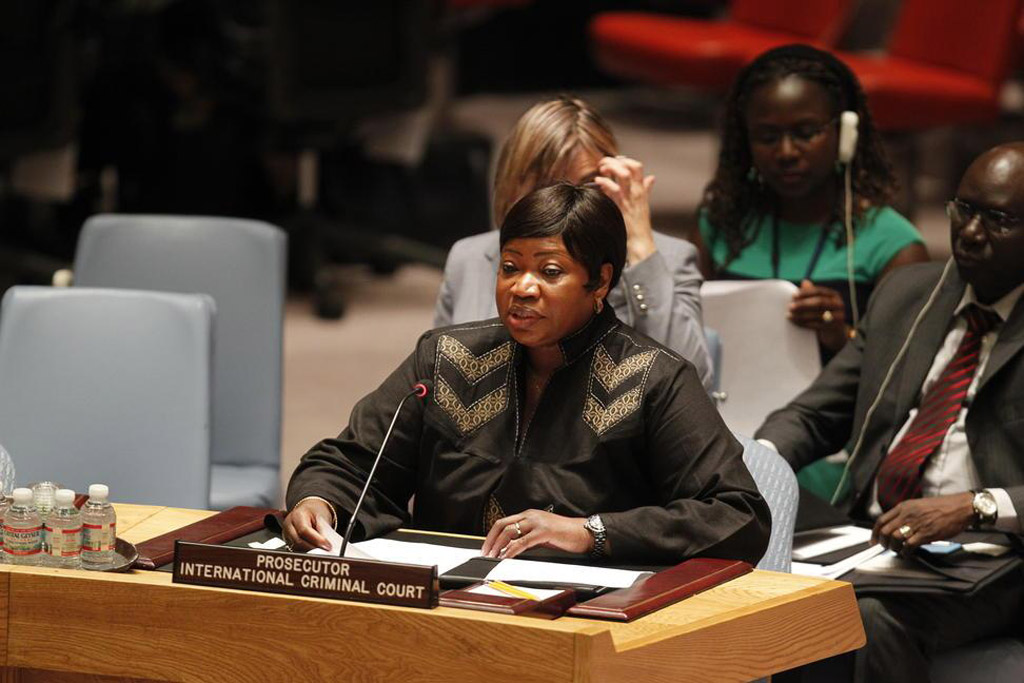“What have we achieved in concrete terms? Have we lived up to the expectations of Darfur’s victims? Sadly, the intellectually honest answer is a resounding ‘no,’” Fatou Bensouda said as she began her briefing to the Council with a look back over the nearly 10 years since it had referred the situation in Darfur to the Hague-based Court.
Finding no cause for celebration, especially since no steps have been taken regarding the arrest and surrender of a number of high profile indictees, including Sudanese President Omar Al Bashir, she said, the “sad reality is that action from this Council has not been forthcoming when it mattered most for Darfur’s victims.”
And while the ICC may have significantly contributed to raising awareness about the massive and systematic crimes committed in Darfur, the Court’s best contribution to ending impunity through a judicial process that independently, fairly and impartially assess the evidence and determines guilt or innocence has yet to be achieved. Indeed, continued Ms. Bensouda: “The ICC’s judicial process cannot take place without arrests. Darfur suspects remain at large and no meaningful steps have been taken to apprehend them and bring them to justice.”
“Today we are in the same position as we were in 2007”, she said, following the Council’s “much-lauded” referral of the case to the Court and the issuance of arrest warrants for Ahmad Harun and Ali Kushayb, and, subsequently, President Bashir, who continues to travel in defiance of the warrants, including to States party to the Court’s founding Rome Statute.
“This reflects badly, not just on the international justice system of which the ICC is only a part, but it also greatly undermines the credibility of this Council as an instrument of international peace and security,” said Ms. Bensouda, adding that it is high time for Sudan’s ongoing defiance of Security Council resolutions to be matched by the Council’s decisive action.
Darfur’s victims are looking to the Council for answers to critical questions, she continued: For how much longer will legality and accountability be sacrificed at the altar of political expediency?; and What amount of suffering should Darfur’s victims endure for this Council to act decisively on the situation in Darfur?
Drawing the Council’s attention to another important issue, she said recent allegations that reporting of the African Union-United Nations Mission in Darfur (UNAMID) has been subject to manipulation, with the intentional effect of covering up crimes committed by the Sudanese Government, “should be a matter of concern for us all.”
Those allegations call for thorough, independent and public enquiry, Ms. Bensouda said, noting that while the responsibility for this manipulation may lie with a handful of individuals, it impugns the credibility of the Mission as a whole and deprives advocates of peace and justice of an essential tool for evaluating the ever evolving situation in Darfur.
“Victims in Darfur and the peacekeepers who have sacrificed their lives deserve better. We all do,” she declared, expressing the hope that the Council and the wider UN take immediate and concrete steps to establish the full facts and take appropriate action if the allegations prove to be well-founded.
As for the current situation on the ground in Darfur, she expressed “deep concern” over the increasing violence and the immense number of people who continue to be displaced. “I likewise deplore the increasing constraints placed on those who are trying to aid the displaced…the deliberate obstruction of humanitarian aid must end.”
Equally concerning is the on-going patterns of aerial bombardments and armed attacks on civilian populations by militia/Janjaweed, and in particular, the involvement of the newest iteration of the Janjaweed, the Rapid Support Forces, led by Mohamed Hamdan.
“It is particularly disturbing that in February this year, the Rapid Support Forces shifted their operations from North Kordofan to Darfur,” noted Ms. Bensouda, stressing that her Office’s factual indicators seem to illustrate a similar pattern of indiscriminate and disproportionate attacks against civilians by the Rapid Support Forces. In all of the reported attacks, crimes against civilians were allegedly committed from the end of February, onwards, coinciding with the deployment of the Rapid Support Forces to Darfur.
Overall, she called for a dramatic shift in the Council’s approach to arresting Darfur suspects, especially since the Sudanese Government “has consistently failed” to carry out its primary responsibility to implement the outstanding arrest warrants. I believe that concerted efforts to promote cooperation with the Court may fill the gap,” she said, calling on States and the Council to find creative ways to supports “those amongst them that may be most vulnerable” to planned visits by President Bashir or other indictees.



